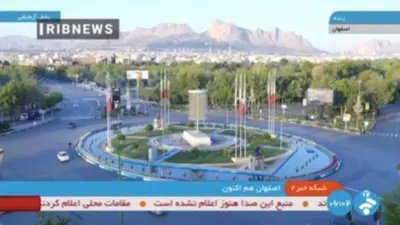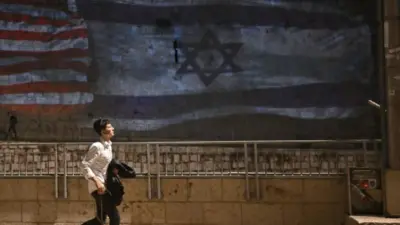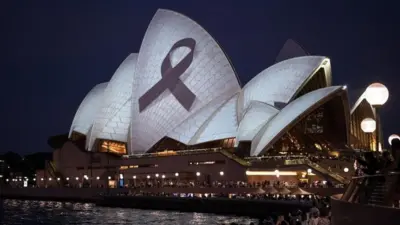We've updated our Privacy and Cookies Policy
We've made some important changes to our Privacy and Cookies Policy and we want you to know what this means for you and your data.
Iran Natanz nuclear site suffered major damage, official says
Image source, Getty Images
Thousands of machines used to refine nuclear material were destroyed or damaged in an attack at a key site on Sunday, an Iranian official has said.
Alireza Zakani, head of the Iranian parliament's Research Centre, said the incident had "eliminated" Iran's ability to carry out the process.
The attack took place in a facility up to 50m (165ft) underground, another official said.
Iran has blamed Israel for what it called an act of "nuclear terrorism".
Israel has neither confirmed nor denied involvement, but Israel public radio cited intelligence sources as saying it was a Mossad cyber-operation.
Iran says it will replace the affected centrifuges - machines used to refine, or enrich, the chemical element uranium for use in nuclear energy or potentially nuclear bombs - with more advanced ones.
It also announced on Wednesday that it would greatly increase the quality of enrichment - from 20% to 60% purity. Enriching to either level is prohibited under the terms of the 2015 nuclear deal, and while 60% is significantly closer to the 90% required for a nuclear weapon, it is still some way off.
Meanwhile, Israeli and Arab media reports say an Israeli-owned vessel has been damaged in an attack off the coast of the United Arab Emirates.
Unnamed officials quoted by Israel's Channel 12 TV blamed Iran for the strike on the Hyperion Ray. If confirmed, it would be the latest in a series of alleged tit-for-tat attacks on Israeli and Iranian vessels.
How serious is the damage?
Iran had initially acknowledged that centrifuges were damaged, but without elaborating.
However, speaking on state-run Ofoq TV channel, Mr Zakani said the damage was extensive.
"Is it normal that today they reach a pit of our electricity system and take actions so that several thousand centrifuges are damaged and destroyed in one instant?" he asked.
"Should not we be sensitive over the incident that happened [on Sunday], eliminating the main part of our enrichment capacities?"
Iran nuclear crisis: The basics
- World powers don't trust Iran: Some countries believe Iran wants nuclear power because it wants to build a nuclear bomb - it denies this.
- So a deal was struck: In 2015, Iran and six other countries reached a major agreement. Iran would stop some nuclear work in return for an end to harsh penalties, or sanctions, hurting its economy.
- What is the problem now? Iran re-started banned nuclear work after former US President Donald Trump pulled out of the deal and re-imposed sanctions on Iran. Even though new leader Joe Biden wants to rejoin, both sides say the other must make the first move.
The issue of Iran's centrifuges is particularly controversial. If enriched to a very high level - which Iran says it is not doing - in the machines, uranium can be used in nuclear bombs. Iran says its centrifuges are enriching uranium only to levels of purity usable for civilian purposes, such as nuclear fuel, agriculture or medicine.
Iran had activated more advanced centrifuges - barred under the 2015 deal - at Natanz, one day before the site was hit by the blast.
US intelligence officials told the New York Times that a large explosion had completely destroyed the independent internal power system that supplied the centrifuges inside the underground facility. They estimated it could take at least nine months to resume enrichment there.
Separately, the former head of Iran's Atomic Energy Organisation has revealed that a blast which hit Natanz in July 2020 was caused by explosives hidden inside a table.
Fereydun Abbasi-Davani told state TV the perpetrators "amended the explosive [in the table] and sealed it, using, perhaps, resin or welding the steel" before managing to get it past security staff.
On Monday, Iran's Foreign Minister Mohammad Javad Zarif said his country would "take revenge" for Sunday's attack, implicitly blaming Israel.
Iran's Nour News agency, which is affiliated to the Supreme National Security Council, cited an intelligence ministry source as saying the "main perpetrator" had been identified and an operation was under way to arrest them.
Israel has recently stepped up its warnings about Iran's nuclear programme amid efforts to revive the nuclear deal that was abandoned by former US President Donald Trump.
His successor, Joe Biden, has said he wants to return to the landmark accord. But Iran and the five other world powers still party to it - China, France, Germany, Russia and the UK - need to find a way for him to lift US sanctions and for Iran to return to the agreed limits on its nuclear programme.
Iran, which insists it does not want nuclear weapons, has retaliated against the sanctions reinstated by the Trump administration by rolling back key commitments under the deal.
US and Iranian officials are holding indirect talks in the Austrian capital, Vienna, to try to break the impasse, with European officials acting as intermediaries.
Top Stories
Features & Analysis
Most read
Content is not available








